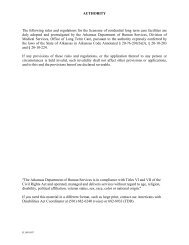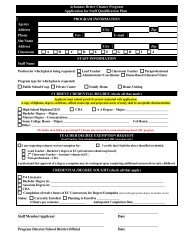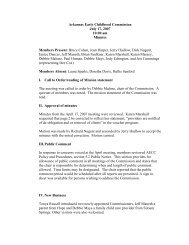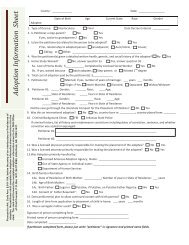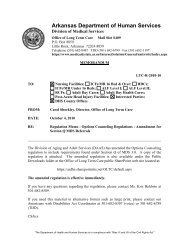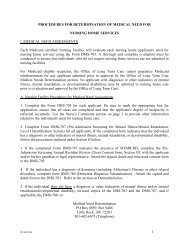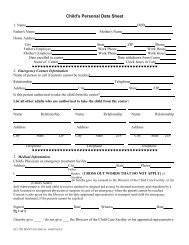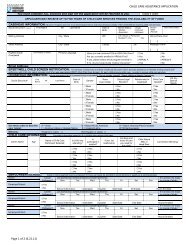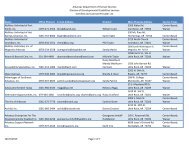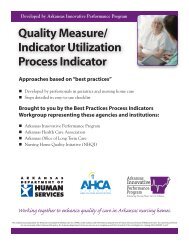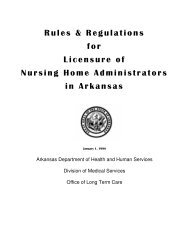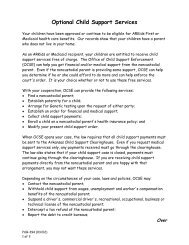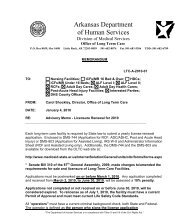Parental Involvment Brochure - Arkansas Department of Human ...
Parental Involvment Brochure - Arkansas Department of Human ...
Parental Involvment Brochure - Arkansas Department of Human ...
Create successful ePaper yourself
Turn your PDF publications into a flip-book with our unique Google optimized e-Paper software.
Making <strong>Parental</strong><br />
Involvement work<br />
for the working parent.<br />
Many parents work outside the home and find it<br />
difficult to spend time at the school during the day.<br />
However, you don’t have to take <strong>of</strong>f to take your<br />
parental involvement to the next level. It’s important<br />
and easy to be a part <strong>of</strong> your child’s education;<br />
awareness <strong>of</strong> your child’s academic career does not<br />
take that much time and the benefits are invaluable.<br />
Even the busiest parents can:<br />
• Help their children succeed by talking<br />
candidly and constructively with their<br />
teachers about how your children’s scores<br />
fit into or are affected by the school’s<br />
performance overall.<br />
• Ask their school’s principal or teachers<br />
how they and other parents can help the<br />
school work towards improving academic<br />
performance.<br />
• Ask their children’s teachers to provide them<br />
with things they can do at home with their<br />
child that focus on academic objectives.<br />
You Make the Difference.<br />
Parents can play a big role in helping reach the goal<br />
<strong>of</strong> No Child Left Behind (NCLB), which is to close or<br />
dramatically narrow the differences in academic<br />
achievement among students without regard to race,<br />
ethnicity, immigrant status or wealth. All states are<br />
required to set challenging standards for what children<br />
should know and be able to do in reading, math<br />
and science at various grade levels. NCLB requires<br />
every state to bring 100 percent <strong>of</strong> students to state<br />
standards by the year 2014. An increase in <strong>Parental</strong><br />
Involvement at every grade level can help <strong>Arkansas</strong><br />
meet that requirement.<br />
* From a study <strong>of</strong> standards-based reform practices done<br />
by Westat and Policy Studies Associates (2001) for the U.S.<br />
<strong>Department</strong> <strong>of</strong> Education as reported in “A New Wave <strong>of</strong><br />
Evidence: The Impact <strong>of</strong> School, Family and Community<br />
Connections on Student Achievement.”<br />
A Parent’s Guide<br />
to Helping Your<br />
Child Excel<br />
#4 Capitol Mall<br />
Little Rock, AR 72201-1071<br />
(501) 682-4475<br />
www.<strong>Arkansas</strong>Ed.org
What is <strong>Parental</strong><br />
Involvement?<br />
Families have a huge influence on children’s<br />
achievement in school and throughout life. Research<br />
has proven that when families work together to<br />
support learning, children perform better in school,<br />
stay in school longer, and enjoy their education.<br />
<strong>Parental</strong> Involvement is truly the great equalizer:<br />
Studies have found that students with involved<br />
parents, regardless <strong>of</strong> income or background, were<br />
more likely to:<br />
• Earn higher grades and test scores, and enroll<br />
in higher-level programs.<br />
• Be promoted, pass their classes, and earn<br />
credits.<br />
• Attend school regularly.<br />
• Have better social skills, show improved<br />
behavior, and adapt well to school.<br />
• Graduate and go on to postsecondary<br />
education.<br />
What can I do?<br />
Being involved with your child’s education is no longer<br />
just about attending PTA meetings, chili suppers, or even<br />
parent-teacher conferences. It does not mean being<br />
connected once or twice during the school year. Being<br />
involved means being connected on a daily basis with<br />
your child’s education. Show your child that school is so<br />
important that even you feel the need to be there. It<br />
means being a mentor as well as a parent.<br />
Teachers and school administrators want parents to<br />
be involved at home and at school with their children.<br />
Activities for parents should include:<br />
• Engaging in learning activities at home, such<br />
as helping with reading skills and checking<br />
homework.<br />
• Knowing and monitoring what your child is and<br />
should be learning.<br />
• Supervising children and monitoring how they<br />
spend their time out <strong>of</strong> school.<br />
• Talking about school and what children are<br />
learning.<br />
• Attending school events, going to parent-teacher<br />
conferences, meeting with teachers, and<br />
volunteering in the classroom or school.<br />
Parents can definitely be a part <strong>of</strong> the solution<br />
for higher achievement. Ask yourself:<br />
• When was the last time I gave time to<br />
my child’s school?<br />
• Do I understand my child’s required<br />
state testing?<br />
• How can I help improve my child’s test<br />
scores?<br />
• Does my child’s teacher see me as an<br />
educational partner?<br />
By forming a partnership with teachers, parents<br />
can make a huge difference in their student’s<br />
performance from kindergarten through 12 th<br />
grade. Parents should know the expectations <strong>of</strong><br />
the school and insist that they be high. Benefits<br />
<strong>of</strong> <strong>Parental</strong> Involvement in the classroom include:<br />
• First-hand understanding <strong>of</strong><br />
expectations in the classroom.<br />
• Knowledge <strong>of</strong> curriculum policies,<br />
programs, and opportunities.<br />
• Increased sense <strong>of</strong> comfort and<br />
ownership at school.<br />
• Observation <strong>of</strong> your child to better<br />
understand her strengths/weaknesses.<br />
• Chance to know your child’s friends.<br />
• Opportunity for input into the program.<br />
However, it takes more than engaged parents to produce<br />
high student achievement. There has to be high<br />
expectations <strong>of</strong> students by both parents and teachers.<br />
When students are challenged to do more, they achieve<br />
more. Studies that compared levels <strong>of</strong> involvement found<br />
that achievement increased directly with the extent to<br />
which parents were engaged with the learning process.<br />
And in schools where teachers reported high levels <strong>of</strong><br />
outreach to parents, test scores grew at a rate <strong>of</strong> 40<br />
percent higher than in schools where teachers reported<br />
low levels <strong>of</strong> outreach.*<br />
When students<br />
are challenged<br />
to do more, they<br />
achieve more.



